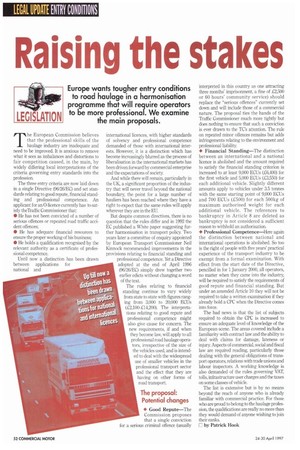Raising the stakes
Page 54

If you've noticed an error in this article please click here to report it so we can fix it.
Europe wants tougher entry conditions to road haulage in a harmonisation programme that will require operators to be more professional. We examine the main proposals.
The European Commission believes that the professional skills of the haulage industry are inadequate and need to be improved. It is anxious to remove what it sees as imbalances and distortions to fair competition caused, in the main, by widely differing local interpretations of the criteria governing entry standards into the profession.
The three entry criteria are now laid down in a single Directive (96/26/EC) and set standards relating to good repute, financial standing and professional competence. An applicant for an 0-licence currently has to satisfy theTraffic Commissioner that: • He has not been convicted of a number of serious offences or repeated road traffic accident offences; • He has adequate financial resources to ensure the proper working of his business; • He holds a qualification recognised by the relevant authority as a certificate of professional competence.
Until now a distinction has been drawn between applications for national and international licences, with higher standards of solvency and professional competence demanded of those with international interests. However, it is a distinction which has become increasingly blurred as the process of liberalisation in the international markets has been driven forward by commercial enterprise and the expectations of society.
And while there will remain, particularly in the UK, a significant proportion of the industry that will never travel beyond the national boundary, the point for a large number of hauliers has been reached where they have a right to expect that the same rules will apply wherever they are in the EU.
But despite common directives, there is no question that the rules differ and in 1992 the EC published a White paper suggesting further harmonisation in transport policy. Two years later a committee of enquiry appointed by European Transport Commissioner Neil Kinnock recommended improvements in the provisions relating to financial standing and professional competence. Yet a Directive adopted at the end of April 1996 (96/26/EC) simply drew together two earlier edicts without changing a word of the text.
The rules relating to financial standing continue to vary widely from state to state with figures ranging from 3,000 to 20,000 ECUs (.£2,100,,C14,200). The interpretations relating to good repute and professional competence might also give cause for concern. The new requirements, if and when they become law, will apply to all professional road haulage operators, irrespective of the size of the vehicles used, and is intend ed to deal with the widespread use of smaller vehicles in the professional transport sector and the effect that they are having on other forms of road transport.
The proposal: Potential changes
• Good Repute—The Commission proposes that a single conviction for a serious criminal offence (usually interpreted in this country as one attracting three months' imprisonment, a fine of £2,500 or 60 hours' community service) should replace the "serious offences" currently set down and will include those of a commercial nature. The proposal ties the hands of the Traffic Commissioner much more tightly but does nothing to ensure that such a conviction is ever drawn to the TC's attention. The rule on repeated minor offences remains but adds infringements relating to the environment and professional liability • Financial Standing—The distinction between an international and a national licence is abolished and the amount required to satisfy the financial standing criterion is increased to at least 9,000 ECUs (£6,400) for the first vehicle and 5,000 ECUs (C3,550) for each additional vehicle. Slightly different amounts apply to vehicles under 3.5 tonnes with the same starting point of 9,000 ECUs and 700 ECUs (£500) for each 500kg of maximum authorised weight for each additional vehicle. The references to bankruptcy in Article 8 are deleted as bankruptcy is not considered a sufficient reason to withhold an authorisation.
• Professional Competence—Here again the distinction between national and international operations is abolished. So too is the right of people with five years' practical experience of the transport industry to be exempt from a formal examination. With effect from the start date of the Directive, pencilled in for 1 January 2000, all operators, no matter when they came into the industry will be required to satisfy the requirements of good repute and financial standing. But under an amended Article 10 they will not be required to take a written examination if they already hold a CPC when the Directive comes into force.
The bad news is that the list of subjects required to obtain the CPC is increased to ensure an adequate level of knowledge of the European scene, The areas covered include a familiarity with contract law and the ability to deal with claims for damage, lateness or injury Aspects of commercial, social and fiscal law are required reading, particularly those dealing with the general obligations of transport operators, relations with trade unions and labour inspectors. A working knowledge is also demanded of the rules governing VAT, tolls, infrastructure user charges and the taxes on some classes of vehicle.
The list is extensive but is by no means beyond the reach of anyone who is already familiar with commercial practice. For those who are proud to belong to the haulage profession, the qualifications are really no more than they would demand of anyone wishing to join their ranks.
E by Patrick Hook




















































































































